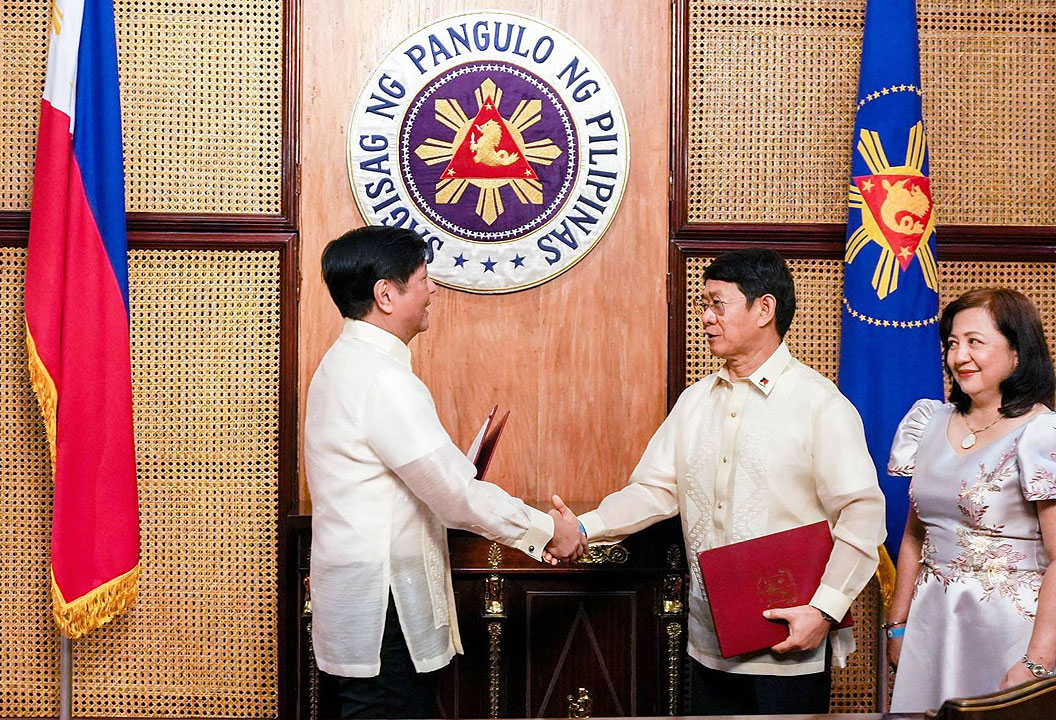
By Kyle Aristophere T. Atienza, Reporter
ANALYSTS expect a shift towards a more militarist approach in the Marcos administration’s national security policy after the appointment of a former military general to the National Security Council (NSC).
Malacañang on Saturday announced that Eduardo M. Año, a retired general of the Philippine Army, has been appointed as President Ferdinand R. Marcos, Jr.’s national security adviser, replacing Clarita A. Carlos, a political scientist and retired University of the Philippines professor.
“It would have been more strategic for the President to retain Prof. Carlos because her geopolitics perspective would have been a potent complementary side to the military perspective that the Armed Forces of the Philippines (AFP) and Philippine National Police bring to the table,” Michael Henry Ll. Yusingco, a policy analyst, said in a Facebook Messenger chat.
“The President would have gotten a more complete and comprehensive policy advice had she been retained,” he added.
Mr. Yusingco said the appointment of Mr. Año, who also served as Interior secretary under former President Rodrigo R. Duterte, “run the risk of our national security policy being solely driven by military thinking.”
“This may not be optimal for the country under the current global circumstances,” he said.
Activist groups have linked Mr. Año to cases of human rights violations. He had been implicated in the disappearance of activist Jonas Burgos, who was abducted in a Quezon City mall by suspected members of the military in 2007 and has not been found since.
At that time, Mr. Año was the head of the Army’s intelligence division.
Neri J. Colmenares, chairperson of party-list Bayan Muna, described Mr. Año’s appointment as a “bad omen” for human rights in the country.
“We must remember that it was during his stint at the Department of the Interior and Local Government that the killings during the fake drug war raged and illegal arrests, massacres and trumped charges flew left and right against the opposition and critics of the Duterte administration,” Mr. Colmenares said in a statement on Sunday.
‘BIGGER PICTURE’
The national security adviser leads the NSC, which advises the President on security and foreign policy issues.
“Obviously, military concerns and strategies are vital when it comes to national security. But right now, there are national security threats that operate on a global scale,” Mr. Yusingco said. “So a military perspective may not be enough to see the bigger picture.”
“Geopolitics necessarily must also be factored in when it comes to formulating a national security framework for the country,” he added.
“Now that Gen. Año is there, this really puts pressure on the Department of Foreign Affairs to supply that geopolitics perspective,” Mr. Yusingco said.
The removal of Ms. Carlos from the NSC comes on the heels of other sudden changes at the security sector, starting with the reappointment of Andres C. Centino as AFP chief of staff.
The unexpected change of command at the military prompted the resignation of Jose C. Faustino, Jr. as officer-in-charge of the Department of National Defense, who left his post after learning “only from news and social media” that a new AFP chief had taken oath in Malacañang.
Secretary Carlito G. Galvez, Jr., also a retired Army general who has been serving as peace adviser under the Duterte and Marcos administrations, has been appointed as concurrent Defense secretary.
Chester B. Cabalza, a national security expert, said with the three chiefs of the “trinity of security sector” now coming from the Army, the largest branch of the military, the public should expect that the “overarching framework of their policy would be internal security and ending insurgency in the country.”
“The epicenter of movements occurred in the defense and security sectors with the changing commands of the chief of staff of the AFP, secretary of National Defense, and national security adviser that expanded to the mass resignations in the police organization,” he said in a Messenger chat.
“But such changes in the trinity of defense and security institutions must have to change since the current administration is cleansing the said organizations aligned to its political interests.”
The appointment of Mr. Año also dispels destabilization rumors hounding the AFP, Mr. Cabalza said.
“The newly appointed officials formerly worked with the Duterte administration,” he added. “That means that the Marcos presidency is keen to navigating into balancing its political interest in the political scene.” — with a report from Beatriz Marie D. Cruz
More militarist approach to security policy seen with Año’s appointment
Source: Bantay Radio
0 Comments